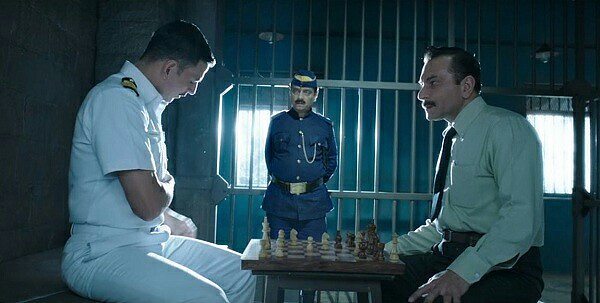By RAHUL DESAI
Director: Tinu Suresh Desai
Cast: Tim Burton’s worst nightmare
Rustom, made by the director of 1920 London, uses the infamous 1959 KM Nanavati Case as a red herring to construct a bastardized hate-child of Himesh Reshammiya’s costume-capered The Xpose and a Balaji-flavoured courtroom-dollhouse drama. In other words, this is an excitable adultery-for-dimwits gabfest where everyone looks like they’re navigating an ill-lit snow globe. In fact, everyone, including some very fine actors, seems to be in that perpetual “Oh, the camera is on me, so I must look act hard” mode. One can almost hear them exhale once the director yells ‘cut!’
In other other words, this is one giant role-play session; the colonial-hangover Bombay Velvet sets seem to have been painted over with cakes of differently-abled CGI, sunsets look like orange juice stains, cheesy chess metaphors (Oh, Wazir) indicate much-wow smartness, public faces are shown nodding vehemently in unison (“Sahi kiya!”) to display unanimous support, steamy affairs look like Madh-island-villa aesthetic condom ads, croma-key scenery looks horribly stretched outside courtroom windows, Napean Sea road bungalows resemble the insides of Katy Perry’s makeup kit, badly-detailed murder scenes are replayed repeatedly to mislead viewers, the background music has multiple seizures, Akshay Kumar goes from cardboard to Cheshire cat in a Bhatt-style alternate-history twist of a real-life event, and community politics bear the subtlety of an Indian sports biopic. Which is ironic, given that the sufficiently terrific trailer of producer Neeraj Pandey’s next directorial venture, Dhoni: The Untold Story, plays right before this film. And downhill we went.
For the uninitiated, a handsome Parsi naval officer walked into the house of his (English) wife’s Sindhi lover, shot him down (“Three bullets that shook the nation,” sensationally yelled Blitz headlines), turned himself in, won public sentiment through the trial and got acquitted through a 8-1 jury verdict (after which the jury system in India was abolished). The man killed was a playboy of questionable character, and the killer was a decorated navy man with no prior criminal behaviour. A weekly tabloid, run by its Parsi editor, vehemently sided with the accused, earning the ire of Sindhis across the globe. The film utilizes this much as its creative license, because it wouldn’t have been ‘commercially viable’ to reveal that the lady actually wanted to marry her lover (here, she is immediately repentant, because hero-heroine in black-and-white shades), and the verdict was then overturned in higher courts. Also, what’s a Bollywood thriller without some underground highly simplified scams?
For the first hour, Rustom turns into caricature central. Rustom Pavri (Kumar) is stone-faced and always in crisp uniform, while Sylvia (Illeana D’Cruz; equipped with a Katrina Kaif accent) is perpetually sour-faced and tearful. Investigating officer Lobo (Pawan Malhotra) moves his ears to intimidate and walks urgently from place to place. Billimoria (Kumud Mishra; playing some parallel-universe avatar of Russi Karanjia) is painted as a comical opportunist, while insufferable playboy Vikram Makhija (Arjan Bajwa) wears silk robes and loves being reflected by multiple bedroom mirrors. Rustom’s superior officer (Parmeet Sethi) is having a ball with the set’s free booze. And, I’m saving the best for last: Esha Gupta, who plays Makhija’s vampy high-society sister, wears Oscar-red-carpet dresses with plunging necklines, scowls at lawyers and cops and humans in general, and sucks on her cigarette holder like she knows it’s her final film. It could well be. One can almost imagine the impassioned director picking out the most absurd glamorous outfits to give her that ‘Hollywood look.’ Whenever she appears on screen, she is in her own spoofy Austin-Power-version-of-a-Russian-spy parody; nobody seems to have told her that the British left 12 years ago, or that shrugging and pouting require different body languages.
The second half has Rustom fighting his own case in front of an impressionable jury – comprising of one dour woman and seven hamming men, who, at one point, even start screaming (“I SAY HE IS GUILTY!” – “I WOULD HAVE KILLED HIM TOO! SHUT UP!”), and strangling each other behind closed doors before coming to a calm consensus. The only reason this film decided to ‘get inspired’ by the Nanavati case is so that they could exploit this jury angle into an orgy of emotionally manipulative (and idiotic) logic. There’s also a motor-mouthed newspaper boy in a scene-stealing cameo (“Hot off the presses! Go home, your wife is alone!”), and the abnormally desperate prosecution lawyer (Sachin Khedekar), who shares the film’s best chemistry with the judge. At one point, the exasperated judge begs him to stop repeating himself, which could well be a metaphor for the film they’re occupying.
There are times during Rustom when it’s hard not to wonder if this film is being intentionally flimsy. You don’t really care for Rustom or his downcast wife, except the one scene when he decides to question her on oath. The plot-twist dealings seem to have been inserted separately between trial proceedings, as if to remind us that this is a painfully original piece of fiction. It had to be; otherwise this would have been just another incompetent Hindi-language biopic. It still is, technically. It’s almost as if Mr. Bean was asked to narrate his interpretation of a nation’s defining trial. Expectedly, it’d become a game of goofy Chinese Whispers for him, and by the end, after he gives up trying to recite from memory, you’d feel sorry for his sheer incompetence.
Is it midnight yet? Are we done with Cinderella-Gupta’s costume ball? Good. Let’s go back to our dull-looking, pastel-coloured, normal flats overlooking sewers and non-vintage cars.
(Pro-tip: Wear dark glasses to the show. The 1950s will blind you.)







Leave A Comment
You must be logged in to post a comment.